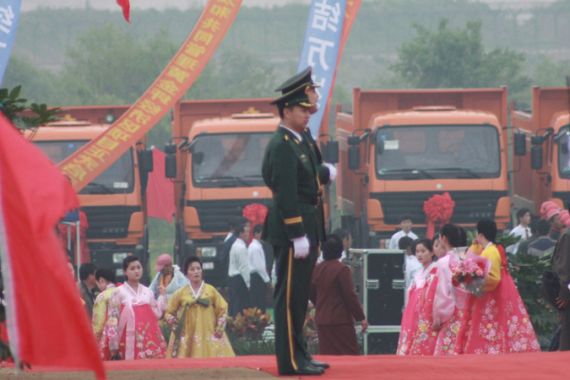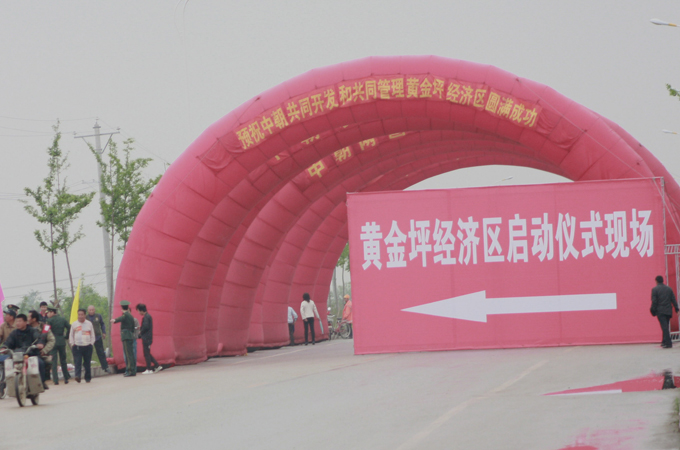China and N Korea launch joint economic zones
Projects follow Kim Jong Il’s visit to China last month, where he was urged to implement economic reforms.

 |
| Little is known about plans for the development projects and what they will have to offer [EPA] |
China and North Korea have formally started construction of two joint economic zones near their border, on the North Korean islands of Hwanggumpyong and Wihwa on the west, and the Rajin-Sonbong area on the east.
Ceremonies marking the start of the projects took place during consultations held in China’s northeastern provinces of Liaoning and Jilin from Tuesday to Thursday, the Chinese commerce ministry said in a statement on Thursday.
The sides agreed that the economic zones should be developed along “government-guided, enterprise-based and market-oriented” principles, the ministry said.
Present at the event were: Chen Deming, the Chinese commerce minister; Jang Song-thaek, the vice-chairman of North Korea’s powerful National Defence Commission and brother-in-law of the North’s leader Kim Jong Il; and various officials of the local district councils, it said.
The officials said the ceremony was held “in the historical period [following a recent visit to China by] Kim Jong Il … recording a new chapter in the history of the traditional DPRK-China friendship”, North Korea’s official KCNA news agency reported, also on Thursday.
DPRK refers to North Korea’s formal name, the Democratic People’s Republic of Korea.
Elusive projects
Little is known about plans for the development projects and what they will have to offer.
Both countries have divulged little information, save for the fact that the zones will improve freight transportation by opening up access to sea for China’s northeast provinces.
The Hwanggumpyong and Wihwa Islands on the Yalu River near the Chinese city of Dandong, have “favourable conditions for emerging a world trade and investment hub connecting Northeast Asia with Europe and North America,” officials said in their congratulatory remarks, KCNA reported.
“… it is linked with the DPRK, China and Russia bordering on the Tumen River and has [the] East Sea.
“Smooth progress in the joint development and operation of the zone would promote from a new angle the economic development, in not only the two countries but also Northeast Asia, and give affirmative effect on the global economic development,” they said.
KCNA said that the ceremony at the Rajin-Sonbong special economic zone, often abbreviated as “Rason”, broke ground for the construction of a road and a cement factory and saw the launch of Chinese domestic freight transportation via Rajin Port, and a private car tourism project as the first phase initiatives.
Rason, located near China’s northeastern Yanbian county, could bring “about a turn in freight transit transportation and tourism by speedily solving the issue of electricity and winding up the projects for modernization of Rajin Port and reconstruction of Rajin Port-Wonjong road through positive cooperation within this year,” the report said.
Unclear prospects
The joint projects follow Kim’s visit to China last month, his third within a year, which was seen a sign of desperation for the reclusive North’s ailing economy.
Pyongyang has been hit by various UN sanctions, imposed after a May 2009 atomic test, in order to pressure it for a return to six-country nuclear talks.
China, the North’s closest and most crucial ally, has pressed Kim to adopt changes to revitalise his nation’s industry and agriculture, but is unclear how far he is willing to go.
Beijing has been careful to forestall the regime’s collapse, as it could unleash political chaos and send waves of refugees across its border.
At the same time, China has increased its investment in improving the economy in its northeastern provinces along the border shared with North Korea, looking for a way to access the sea on the Korean peninsula’s east, and allow transportation of goods.
North Korea has been attempting to follow the Chinese economic model, introducing various laws, tax breaks and special economic zones like the Rason, which was first established in 1991 to introduce foreign investment.
It attempted at a second special economic zone in the border city of Sinuiju, but the plan was abandoned after China arrested Yang Bin, the Dutch-Chinese businessman who was leading the project.